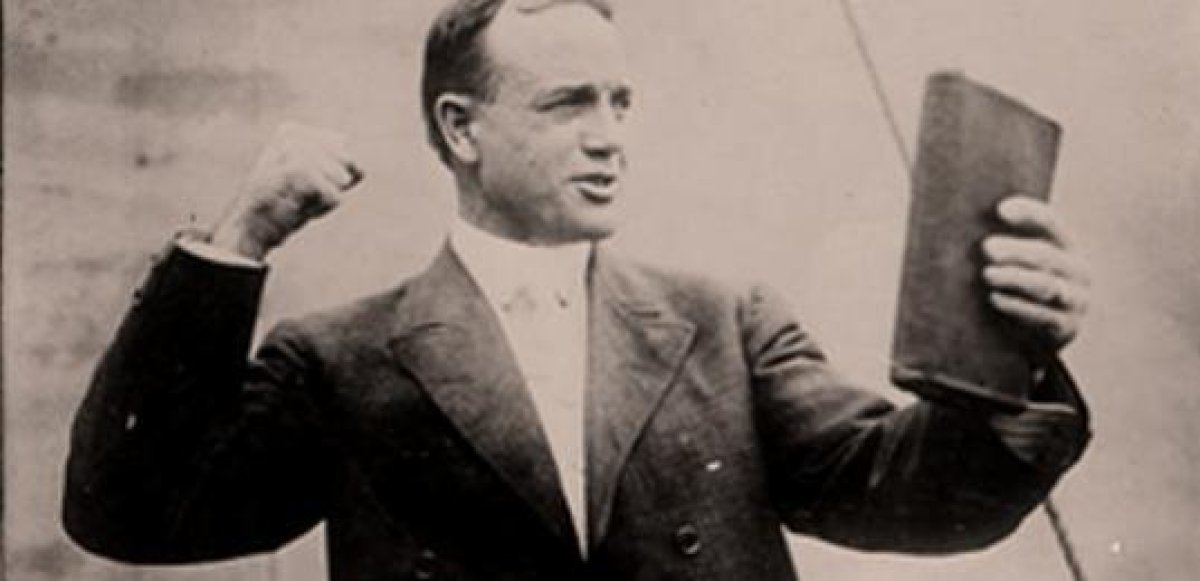I recall the first time a little girl asked me to sign her Bible after I had preached in the fall of 1972. Signing my autograph was easy, but I knew it was customary for preachers to put a verse beneath their names. For some reason, 2 Timothy 4:1–8, came to my mind and since then I have always used those verses with my signature. When God called me to preach, I knew I had very little to offer God, but I knew that His Word was powerful and could change lives forever. I have asked God to let my preaching be dominated with His Word, rather than my opinion, my advice, or my experiences.
I love the admonition of Paul to Timothy—preach the Word! Preach means “to cry out, herald, or exhort.” Haddon W. Robinson states, “Preaching should so stir a man that he pours out the message with passion and fervor. Not all passionate pleading from a pulpit, however, possesses divine authority. When a preacher speaks as a herald, he must cry out ‘the Word.’ Anything less cannot legitimately pass for Christian preaching.”
Paul goes on to say in 2 Timothy 4:2,“…be instant in season, out of season; reprove, rebuke, exhort with all longsuffering and doctrine.” Like a military officer, the aged apostle gives five important imperatives to young Timothy as he begins his ministry of preaching.
1. Readiness
The command to, “Be instant in season, out of season” carries the picture of a soldier on duty, ready for battle at any moment. Dr. B. Myron Cedarholm used to tell us “preacher boys” in college to always be ready, “To preach, pray, or die.” Preaching is not something we do only when we feel like it or when the audience is receptive to our message. Later in verses 3–4, Paul reminds us, “For the time will come when they will not endure sound doctrine; but after their own lusts shall they heap to themselves teachers, having itching ears; And they shall turn away their ears from the truth, and shall be turned unto fables.” Harold T. Bryson reminds us that “the proclaimer of God’s Word needs to stay with the task of preaching whether he feels like it or not…. The preacher must be faithful to preach the Word regardless of whether listeners welcome it, reject it, or ignore it.”
2. Reprove
The next imperative—to “reprove”—applies to human reason. This word carries the idea of a lawyer cross-examining or questioning a witness. Refuting error or proving something wrong is a huge part of the preacher’s responsibility. A few verses earlier in 2 Timothy 3:16, the Holy Spirit reminds us that the Word of God is profitable for reproof. In Titus 1:9–11 we see that a preacher must be one who is, “Holding fast the faithful word as he hath been taught, that he may be able by sound doctrine both to exhort and to convince the gainsayers. For there are many unruly and vain talkers and deceivers, specially they of the circumcision: Whose mouths must be stopped, who subvert whole houses, teaching things which they ought not, for filthy lucre’s sake.” Ephesians 5:11 states, “And have no fellowship with the unfruitful works of darkness, but rather reprove them.” Bryson explains, “To reprove in preaching means to present the axioms of the Christian faith or to refute in a reasoned manner the errors marshaled against the faith.”
3. Rebuke
In the first century, the verb rebuke referred to moral censure. When people turn from the truth of God’s Word, often the next step is into sin. As preachers, we must be willing to confront people with what the Bible says about their sin. In 1 Timothy 5:20, Paul stated, “Them that sin rebuke before all, that others also may fear.” In Titus 1:12–13, he says, “…the Cretians are always liars, evil beasts, slow bellies. This witness is true. Wherefore rebuke them sharply, that they may be sound in the faith.” Like Nathan of old, the preacher must be willing to expose sin and declare, “Thou art the man.” Preaching must reach the conscience of a man if change is to take place.
4. Revive
The word exhort in our passage has a double meaning, in that it means “to comfort” as well as “to urge.” Many today are hurting in despair, discouragement, and disappointment. The preacher must revive the heart of the despondent with the Word of God. But he must also urge and persuade the apathetic to action. Reviving the indifferent to obedience is needed today in this Laodicean age of “going through the motions” and “comfort zone” Christianity. The need of this hour is revival, and the preacher of God’s Word must exhort God’s people to awaken out of their sleep and redeem the time.
5. Remain
Then Paul tells the preacher that he must do all of this with, “All longsuffering and doctrine.” Preaching requires a faithful patience. The seed must be sown, then watered, cultivated, fertilized, and, in time, harvested. James uses the farmer as our example in James 5:7–8: “…behold, the husbandman waiteth for the precious fruit of the earth, and hath long patience for it, until he receive the early and the latter rain. Be ye also patient; stablish your hearts….” As we are faithful, God promises to give the increase. “For as the rain cometh down, and the snow from heaven, and returneth not thither, but watereth the earth, and maketh it bring forth and bud, that it may give seed to the sower, and bread to the eater: So shall my word be that goeth forth out of my mouth: it shall not return unto me void, but it shall accomplish that which I please, and it shall prosper in the thing whereto I sent it” (Isaiah 55:10–11). No other endeavor in life promises those kinds of results!
Bryson again writes, “Anyone desiring to be a preacher must hear the imperative, ‘Preach the Word!’ and then begin to obey the mandate. Preaching the Word is the task of a born-again believer who has received a unique call of God. When God calls anyone to expound the Bible, He bestows the gift of expounding. God gives abilities to interpret, skills to communicate, and competence for speaking. But God’s gifts do not come without human cooperation. The preacher must study the Bible, learn people’s needs, develop communication skills, learn sermon organization skills, and develop constantly in the many areas of the preaching task. To preach the Word means to act as if everything in preaching depends on God and to work as if everything depends on the preacher. Preaching involves a pilgrimage full of glories, challenges, discouragements, delights, failures, improvements, and possibilities.
“The message of the biblical preacher is the most important message in the world. It calls for an all-out human effort coupled with the supernatural moving of the Holy Spirit, in both preparation and presentation. This involves hard work. There is no substitute.”
Preaching requires a 24/7 commitment. The message cannot be separated from the messenger. Good food served with dirty hands is undesirable. The construction of our homiletics and the condition of our hearts must be in harmony.



